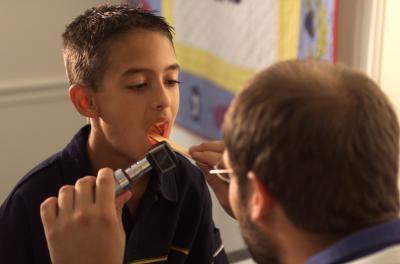When you or your child has strep throat, symptoms are generally much more severe than when you have a regular sore throat. The cause of strep throat is also different than other sore throats. Bacteria known as Streptococcus pyogenes causes strep while certain viruses cause most other sore throats, according to KidsHealth. Virus caused sore throats usually resolve without medication. You most likely need to take antibiotics to cure strep throat.
Types of Symptoms
The most obvious symptoms of strep throat include pain in the throat, swollen tonsils and lymph glands, and trouble swallowing. You may also notice white spots on the tonsils or redness in the back of your mouth. Other symptoms of strep throat are flu-like and include a fever, headache and feelings of fatigue and malaise. You or your child may also experience stomach pains, nausea and vomiting. In some cases, a rash may develop from toxins produced by the bacteria, according to Medline Plus.
Getting Strep Throat
Strep throat is a contagious disease that is most likely to afflict school-aged children, though any one get it, according to KidsHealth. The bacteria spreads through droplets from the nose or mouth. You can spread or get strep throat by sneezing into your hands, then shaking someone else’s hand or by sharing food or beverages with an infected person.
Diagnosis
You cannot simply look a child’s symptoms and determine that he has strep throat. Typically, you should visit a doctor when you or your child has symptoms of strep throat. The doctor will examine the child’s throat and will most likely take a sampling of cells from the back of his throat. The cells are then tested for bacteria. Quicker methods of diagnosing strep throat include an antigen test, which looks for evidence of bacteria in the throat but not the actual bacteria itself. Antigen tests may not catch all cases of strep throat.
Treatment and Cure
Two antibiotics, penicillin and amoxicillin, can cure strep throat. Other antibiotics, such as erythromycin, can also cure strep throat if a patient is allergic to penicillin. Usually, symptoms clear up within a day of taking the antibiotics and a person is no longer contagious. Even though you may feel better, it is important you take the full course of medication to make sure you clear the bacteria from your system entirely.
Prevention/Solution
Keep your child out of school for at least a day, or until your doctor decides it is safe for him to return to prevent the spread of the infection. Thoroughly wash any eating utensils and bed sheets after treatment begins. MedlinePlus recommends replacing your toothbrush after you are no longer contagious but before you finish the course of antibiotics to prevent a new infection. Regular hand washing will also help prevent you and your children from spreading or receiving strep throat.





